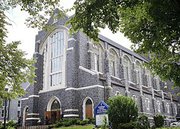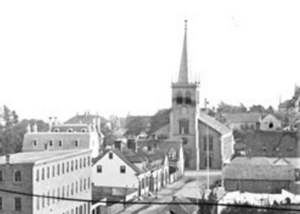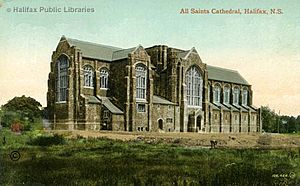All Saints Cathedral (Halifax, Nova Scotia) facts for kids
Quick facts for kids Cathedral Church of All Saints |
|
|---|---|
 |
|
| 44°38′25.60″N 63°34′46.85″W / 44.6404444°N 63.5796806°W | |
| Location | 1330 Cathedral Lane, Halifax, Nova Scotia |
| Country | Canada |
| Denomination | Anglican Church of Canada |
| Membership | 300 families |
| Website | cathedralchurchofallsaints.com |
| Architecture | |
| Architect(s) | Ralph Adams Cram |
| Style | Gothic Revival |
| Groundbreaking | 1907 |
| Completed | 1910 |
| Specifications | |
| Length | 255 feet |
| Width | 86 feet |
| Nave width | 58 feet |
| Height | 68 feet |
| Administration | |
| Diocese | Nova Scotia and Prince Edward Island |
| Province | Canada |
The Cathedral Church of All Saints, also known as All Saints Cathedral, is a large and important church in Halifax, Nova Scotia. It serves as a main church for the Anglican Church of Canada in the area.
This cathedral is the main church for the Anglican Diocese of Nova Scotia and Prince Edward Island. This diocese is special because it has two main cathedrals. The other one is St. Peter's in Charlottetown, Prince Edward Island.
All Saints Cathedral is located on Cathedral Lane in the South End of the Halifax Peninsula. It was designed in a neo-Gothic style by architect Ralph Adams Cram. The stone building opened in 1910. It is about 77 meters (255 feet) long. The main hall, called the nave, is about 21 meters (68 feet) high.
Contents
History of All Saints Cathedral
Building a New Cathedral
Before All Saints Cathedral was built, there was another church called St. Luke's Pro Cathedral. Sadly, St. Luke's was destroyed in 1905. This meant a new, larger cathedral was needed for the growing community.
Work on the new All Saints Cathedral began in 1907. It was a big project to create such an impressive building. The church officially opened its doors in 1910.
Early Days and Design
When it was first built, the cathedral was missing its central tower. This tower was a key part of the original design. Even without it, the building was very grand. It quickly became an important landmark in Halifax.
Remembering Heroes
The cathedral has beautiful stained-glass windows. Some of these windows remember the brave men and women from the Diocese who died in World War I. They serve as a lasting tribute to their sacrifice.
Inside the cathedral, you can also see the sword of Philip Bent. He was born in Halifax and was awarded the Victoria Cross. This is a very high award for bravery. He was killed in 1917, and his sword is a special part of the cathedral's history.
Inside the Cathedral
The Amazing Pipe Organ
The Cathedral is home to a very special pipe organ. It was first built in 1910 by a company called Casavant in Québec. In 1961, it was rebuilt by a British company.
In 2011, the organ got a big upgrade. The control panel, called the console, was improved. Now, it can remember 250 different sound settings. It can also record music and play it back later.
A cool feature of the new console is that it can be moved. This means it can be in its usual spot for church services. But for concerts, it can be moved to the best place for the sound.
This organ is huge! It has four keyboards and 75 different sounds, called stops. It is the largest organ east of Montreal. Many famous musicians from around the world have played it. It's used for church services and also for amazing concerts.
More to Explore
- Dean of Nova Scotia
- List of cathedrals in Canada
- List of highest church naves
- List of longest church buildings in the world
- List of oldest buildings and structures in Halifax, Nova Scotia
 | Anna J. Cooper |
 | Mary McLeod Bethune |
 | Lillie Mae Bradford |



